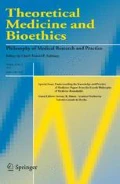Abstract
Medical work is increasingly being subjected to objective assessment as those who pay for it seek to grasp the quality of that work and how best to improve it. While objective measures have a role in the assessment of health care, I argue that this role is currently overestimated and that no human practice such as medicine can be fully comprehended by objective assessment. I suggest that the character of practices, in which formalizations are combined with judgment, requires that valid assessment involve the perspective of the skilled practitioner. Relying exclusively on objective measures in assessing health care will not only distort our assessments of it but lead to damage as the incentives of health care workers are directed away from the important aspects of their work that are not captured by objective measures.
Similar content being viewed by others
Notes
Accreditation Council for Graduate Medical Education [3] (2001, http://www.acgme.org/acWebsite/home/home.asp). Accessed 5/17/07.
An illustration owed to Cussins [4].
In regard to perception conceived as an achievement, see Noe [10].
This is of course a controversial claim. The world exists apart from our concepts but we necessarily apprehend it through them. The dominant tradition in linguistics and analytic philosophy views this apprehension as mediated primarily through representations; we form concepts that mirror the world and hence achieve a cognitive grasp of it—thus “referential realism” (to use Hanna and Harrison’s term; see footnote 3) in theories of meaning and representation theories of mind in philosophy of mind. I follow here an opposing tradition, upheld in continental philosophy and by a minority of analytic philosophers influenced by Wittgenstein who reject the primacy of representations in favor of some variant of “knowing how”—knowing how to act in a social practice for Wittgenstein and his successors, “embodied coping” for Hubert Dreyfus, “sensorimotor knowledge” in the work of Alva Noë, “motor intentionality” for Merleau-Ponty. As Charles Taylor contends, “our grasp of things is not something that is in us, over against the world; it lies in the way we are in contact with the world, in our being-in-the-world....” [11]. See also Haugeland [12], Devitt [13], Dreyfus [14], Hanna and Harrison and Stroud as cited in footnote 3, above.
I owe this illustration to Nelson, “Unlike Calculating Rules.”
This line of objection to the ACGME’s approach to assessing competence in medical trainees is developed further in Huddle and Heudebert [15].
CMS Office of Public Affairs [20]. Press Release, Center for Medicare and Medicaid Services Website, http://www.cms.hhs.gov/apps/media/press_releases.asp. Accessed 18 May 2007.
A point forcefully made by O’Neill [21].
References
Epstein, Arnold M. 2006. Paying for performance in the United States and abroad. New England Journal of Medicine 335: 406–408.
Institute of Medicine of the National Academies. 2006. Pathways to quality health care: Performance measurement; accelerating improvement. Washington: The National Academies Press.
Accreditation Council for Graduate Medical Education, Outcome Project. 2001. Chicago http://www.acgme.org/acWebsite/home/home.asp
Cussins, Adrian. 2002. Experience, thought and activity. In Essays on nonconceptual content, ed. York H. Gunther. Cambridge: MIT Press.
Stroud, Barry. 1996. Mind, meaning and practice. In The Cambridge companion to Wittgenstein. Cambridge: Cambridge University Press.
Hanna, Patricia, and Bernard Harrison. 2004. Word and world: Practice and the foundations of language. Cambridge: Cambridge University Press.
Schatzki, Theodore R. 2003. A new societist social ontology. Philosophy of the Social Sciences 33: 174–202.
Nelson, James Lindemann. 2001. ‘Unlike calculating rules’? Clinical judgment, formalized decision making, and Wittgenstein. In Slow cures and bad philosophers: Essays on Wittgenstein, medicine and bioethics, ed. C. Elliott. Durham: Duke University Press.
McDowell, John M. 2002. Wittgenstein on following a rule. In Rule-following and meaning, ed. A. Miller and Cr. Wright. Montreal: McGill-Queen’s University Press.
Noe, Alva. 2005. Action in perception. Cambridge: MIT Press.
Taylor, Charles. 2000. What’s wrong with foundationalism?: Knowledge, agency and world. In Heidegger, coping and cognitive science: Essays in honor of Hubert L. Dreyfus, vol. 2, ed. M. A. Wrathall and J. Malpas. Cambridge: The MIT Press.
Haugeland, John. 1998. Mind embodied and embedded. In Having thought: Essays in the metaphysics of mind, ed. J. Haugeland. Cambridge: Harvard University Press.
Devitt, Michael. 2006. Ignorance of language. Oxford: Oxford University Press.
Dreyfus, Hubert L. 2002. Intelligence without representation: Merleau-Ponty’s critique of mental representation. Phenomenology and the Cognitive Sciences 1:367–383.
Huddle, Thomas S., and Gustavo R. Heudebert. 2007. Taking apart the art: The risk of anatomizing clinical competence. Academic Medicine 82: 536–541.
Hayward, Rodney A., et al. 2004. Quality improvement initiatives: Issues in moving from diabetes guidelines to policy. Diabetes Care 27(supp. 2): B54–B60.
Rosenthal, Meredith B. 2005. Early experience with pay-for-performance: From concept to practice. Journal of the American Medical Association 294: 1788–1793.
Lindenauer, Peter K., et al. 2007. Public reporting and pay for performance in hospital quality improvement. The New England Journal of Medicine 356: 486–496.
Aston, Geri. 2006. HHS Chief: Get ready for quality reporting. American Medical News. 2 October 2006.
Center for Medicare and Medicaid Services. 2007. Groundbreaking Medicare payment demonstration results in substantial improvement for hospital patient care. 26 January 2007. Center for Medicare and Medicaid Services website, http://www.cms.hhs.gov/apps/media/press_releases.asp
O’Neill, Onora. 2003. Trust with accountability? Journal of Health Services Research & Policy 8: 3–4.
Zimmerman, Ann. 2007. Home depot tries to make nice to customers. The Wall Street Journal. 20 February 2007.
Dewan, Shaila, and Brenda Goodman. 2007. Prosecutors say corruption in Atlanta Police Dept. is widespread. The New York Times. 27 April 2007.
Acknowledgments
I would like to thank Robert M. Centor for helpful comments on earlier versions of this article and the editor of TMBE for useful suggestions.
Author information
Authors and Affiliations
Corresponding author
Rights and permissions
About this article
Cite this article
Huddle, T.S. The limits of objective assessment of medical practice. Theor Med Bioeth 28, 487–496 (2007). https://doi.org/10.1007/s11017-007-9054-9
Received:
Accepted:
Published:
Issue Date:
DOI: https://doi.org/10.1007/s11017-007-9054-9




